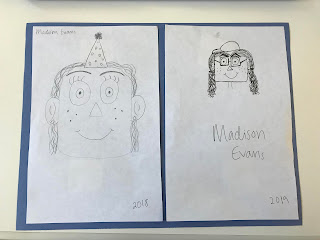Facing Death Full of Life | Learning about Huntington's Disease
[TEDx Talks]
(2015, December 4). Facing death full of life | Danielle Valenti
|TEDxBerkshires [Video File]. Retrieved from https://www.youtube.com/watch?v=6JRwCdmewl0
In this TED Talk, Danielle Valenti
tells the story of her mother’s journey of living with Huntington’s disease and
how it has impacted her lifestyle and outlook on life since her mother’s death.
Her mother knew of her diagnosis of Huntington’s far before she told Danielle
about it. Once symptoms began to arise, she finally told her, and Danielle’s
mother eventually ended up in a nursing home. She told Danielle that she was
going to stop eating and slowly take her own life so that she wouldn’t have to
spend her life progressively dying in a nursing home. She also didn’t want
Danielle to spend the rest of her healthy life driving to the home to take care
of her if Danielle ended up having the Huntington’s gene as well. At this
point, Danielle had not been genetically tested. Her mother ended up passing
away sixty-seven days after her last bite of food. She was only fifty-five
years old. Danielle talked about how tough the mourning process was, and she
decided to finally get genetically tested in order to find closure and
acceptance following her mom’s death. The test resulted as positive, and she
talked about how tough it was to accept the fact that this disease had now
determined her destiny. Danielle was diagnosed with Huntington’s disease at
twenty-nine years old. When she filmed this video, Danielle had not begun to
show symptoms yet. She spoke about how she initially had feelings of depression
and hopelessness. However, she said that one day she woke up and decided that she
would make the daily choice to live her life to the fullest and to do small
things each day that make her smile. She admitted that it is so easy to fall
back into old behaviors and anxiety of what is to come, but it is normal for
some days to be better than others. Danielle has the gene for Huntington’s, yet
she has decided to commit to happiness each day. She advised any person in the
audience who is struggling with a life situation to break their life into small
chunks and to be true to themselves while also asking others for help along the
way. This prevents a person from giving into the belief that they can handle a
tough situation on their own. She also recommended giving yourself space to
struggle so that you can then step back, reevaluate your life, and determine
new norms for life according to what is important to you in that moment.
To further my learning of
Huntington’s, I watched this video and viewed Danielle and Danielle’s mom’s
life from an occupational therapist’s point of view. As I listened to Danielle
talk about her mother’s slow decline in cognitive and motor functioning, I
thought about what types of intervention I would include in her mother’s
therapy. I learned from this video that there is no treatment or cure for
Huntington’s disease since it is genetic, so it progresses at its own rate.
Therefore, no amount of therapy could cause a major improvement in functioning
for a client with Huntington’s. However, as an occupational therapist, I could
work on improving her quality of life until she passed away. I could even help
her start a journal to write down her daily thoughts and memories or allow her
to discover new hobbies that she could find purpose and meaning through. My
main goal with a client who had Huntington’s disease would be to help him or
her enjoy life and be as comfortable and content as possible until they passed
away. I would want to ultimately help them find meaning in the tiny things of
their every day life.
I chose to watch this video on
Huntington’s disease since we just recently learned about it in class. I also
wanted to gain a better understanding of what it is like to live with a parent
with Huntington’s and know that you have a 50% chance of having the gene for
the disease as well. Danielle’s talk was inspiring and really puts into
perspective of what it is like to live every day knowing that you have a
condition that is slowly attacking your body. She showed a picture of her mom
from many years ago and then showed a picture of her when she was in the
nursing home, and it shocked me that her mom’s physical appearance and facial
features could change so much in only a few years. While Danielle could live
every day of her life in a self-pitying and depressed state, she strives to
live every day to the fullest and do the things that are most important to her.
That is incredibly inspiring because I cannot imagine what my outlook on life
would be like if I found out I had the gene for such a deadly condition.
Danielle is not letting her condition or diagnosis define her or set the mood
of her daily life, and my hope is that I can empower my clients to do the same
when I am an occupational therapist one day.
Danielle’s talk was so eye-opening
to the world of living with Huntington’s disease, and I would highly recommend
it to anyone who is interested in the disease or for someone who is struggling
to find hope in a tragic situation. The link to watch the video is listed
below:




Comments
Post a Comment